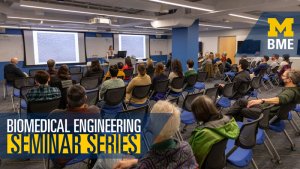Presented By: Biomedical Engineering
Biomedical Engineering Seminar Series
"Engineering Immunosuppression-Free Transplantation," with Jessica Weaver, Ph.D.

Abstract:
The ultimate goal in clinical transplantation is robust and specific host immunological tolerance toward transplanted allogeneic tissue and cells. While systemic immunosuppression regimens have saved lives by enabling long-term allogeneic graft survival, they come with a host of potentially severe side effects, including infections and malignancies. In the Weaver lab, we use biomaterials- and cell therapy-based approaches to eliminate the immune response against allogeneic grafts in a cell transplantation model. This talk will discuss our work developing a hydrogel injection molding encapsulation technique, and our preliminary efforts to develop a professional tolerogenic cell-based therapy.
Bio:
Jessica D. Weaver is an Assistant Professor of Biomedical Engineering in the School of Biological and Health Systems Engineering at Arizona State University and her research centers on developing translatable cell-based therapies for the treatment of disease, with a focus on cell therapies to induce tolerance in transplantation and for the treatment of type 1 diabetes. The Weaver lab uses biomaterials and immune engineering approaches with the aim to generate immunosuppression-free transplantation strategies. Dr. Weaver obtained her PhD in Biomedical Engineering at the University of Miami with Cherie L. Stabler prior to completing a postdoctoral fellowship at the Georgia Institute of Technology with Andres J. Garcia, where she was supported by the NIH ILET2 training grant and a JDRF Postdoctoral Fellowship. Dr. Weaver's lab is currently supported by the Arizona Biomedical Research Commission, the National Institute of Diabetes and Digestive and Kidney Diseases, the National Institute of Allergy and Infectious Disease, and she is the recipient of the 2021 NIH New Innovator Award.
Zoom:
https://umich.zoom.us/j/94337625486
The ultimate goal in clinical transplantation is robust and specific host immunological tolerance toward transplanted allogeneic tissue and cells. While systemic immunosuppression regimens have saved lives by enabling long-term allogeneic graft survival, they come with a host of potentially severe side effects, including infections and malignancies. In the Weaver lab, we use biomaterials- and cell therapy-based approaches to eliminate the immune response against allogeneic grafts in a cell transplantation model. This talk will discuss our work developing a hydrogel injection molding encapsulation technique, and our preliminary efforts to develop a professional tolerogenic cell-based therapy.
Bio:
Jessica D. Weaver is an Assistant Professor of Biomedical Engineering in the School of Biological and Health Systems Engineering at Arizona State University and her research centers on developing translatable cell-based therapies for the treatment of disease, with a focus on cell therapies to induce tolerance in transplantation and for the treatment of type 1 diabetes. The Weaver lab uses biomaterials and immune engineering approaches with the aim to generate immunosuppression-free transplantation strategies. Dr. Weaver obtained her PhD in Biomedical Engineering at the University of Miami with Cherie L. Stabler prior to completing a postdoctoral fellowship at the Georgia Institute of Technology with Andres J. Garcia, where she was supported by the NIH ILET2 training grant and a JDRF Postdoctoral Fellowship. Dr. Weaver's lab is currently supported by the Arizona Biomedical Research Commission, the National Institute of Diabetes and Digestive and Kidney Diseases, the National Institute of Allergy and Infectious Disease, and she is the recipient of the 2021 NIH New Innovator Award.
Zoom:
https://umich.zoom.us/j/94337625486